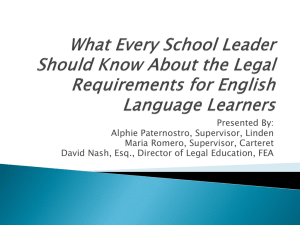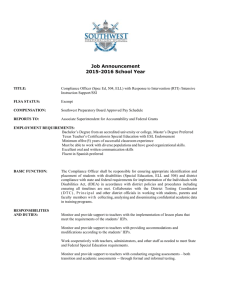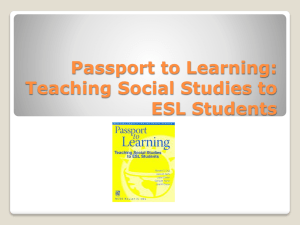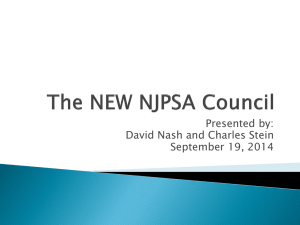Fax Wizard
advertisement
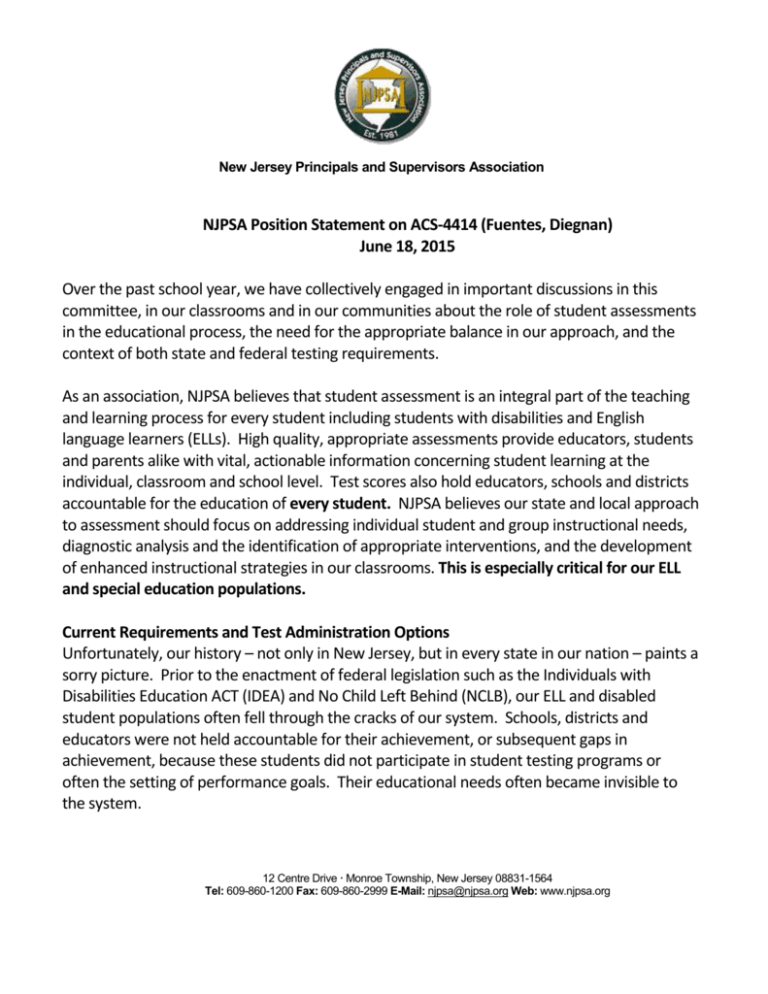
New Jersey Principals and Supervisors Association NJPSA Position Statement on ACS-4414 (Fuentes, Diegnan) June 18, 2015 Over the past school year, we have collectively engaged in important discussions in this committee, in our classrooms and in our communities about the role of student assessments in the educational process, the need for the appropriate balance in our approach, and the context of both state and federal testing requirements. As an association, NJPSA believes that student assessment is an integral part of the teaching and learning process for every student including students with disabilities and English language learners (ELLs). High quality, appropriate assessments provide educators, students and parents alike with vital, actionable information concerning student learning at the individual, classroom and school level. Test scores also hold educators, schools and districts accountable for the education of every student. NJPSA believes our state and local approach to assessment should focus on addressing individual student and group instructional needs, diagnostic analysis and the identification of appropriate interventions, and the development of enhanced instructional strategies in our classrooms. This is especially critical for our ELL and special education populations. Current Requirements and Test Administration Options Unfortunately, our history – not only in New Jersey, but in every state in our nation – paints a sorry picture. Prior to the enactment of federal legislation such as the Individuals with Disabilities Education ACT (IDEA) and No Child Left Behind (NCLB), our ELL and disabled student populations often fell through the cracks of our system. Schools, districts and educators were not held accountable for their achievement, or subsequent gaps in achievement, because these students did not participate in student testing programs or often the setting of performance goals. Their educational needs often became invisible to the system. 12 Centre Drive Monroe Township, New Jersey 08831-1564 Tel: 609-860-1200 Fax: 609-860-2999 E-Mail: njpsa@njpsa.org Web: www.njpsa.org A first step in addressing these national achievement gaps, (particularly with special populations) was to include all students in the assessments, spotlight the results and develop specific annual performance targets. Over the years, Congress has changed our national educational landscape by requiring annual student testing in grades 3 to 8 and once in high school with limited exceptions related to severity of disability or level of proficiency in language. In such cases, alternate assessment options exist. Complex rules and procedures have been established to address the appropriateness of an individual special needs or ELL student’s participation in a particular state test, to provide alternate testing options if educationally appropriate and to provide any necessary accommodations ensuring a fair opportunity for each student to take that test. NJPSA supports this approach which requires professional educators to make these important decisions in consultation with parents through the development of Individualized education plans, Section 504 plans, and Personal Needs Profiles (PNP), a testing needs planning document for students. Testing accommodations are important to ensure that a student’s performance in the classroom and on the assessment is influenced as little as possible by a student’s disability or linguistic characteristics. Accommodations are designed to ensure that every student has a fair opportunity to demonstrate their knowledge of the content being tested without reducing learning or achievement expectations for students or compromising the validity of the assessment itself. In the case of the PARCC assessment, there are both general accessibility features available to every student taking the test (use of highlighter, headphones, pop up glossary, spell checker, etc.) and specialized accommodations for students with disabilities, students with a Section 504 plan and ELL students. Educators develop a Personal Needs Profile to determine the specific testing needs of students. I have attached a listing of the broad range of accommodations available for these special populations for your information. We believe that this range of accommodations is responsive to our students needs. “Unique accommodations” are available on a case by case basis for medical emergencies or accidents not based upon language proficiency or disability as these needs have already been addressed by the accommodations options. As noted, ELL students must be included in state assessments unless they are new arrivals to our country and have been enrolled in a school district for less than a year. The rationale for this exemption is simple; these students are not yet adequately fluent in English to fairly take the assessment, nor would the test results show the students’ knowledge of the content. 2|P a g e This year, for the initial administration of the PARCC assessments, first year ELL student in grades 3 to 8 were eligible for exemption from the assessment, but high school students were not. Testing accommodations were available to assist the students if needed, including translation of test directions into native languages, human translators/reader, dictionaries in multiple language, and native language assessments in mathematics (Spanish only in New Jersey this year). In addition to PARCC, ELL students are annually tested in their English fluency/proficiency levels via the ACCESS test. ELL students are also eligible to meet state testing requirements for graduation through an alternative approach of a portfolio assessment. ACS 4414 With this framework in mind, NJPSA applauds the bill sponsors Assemblyman Fuentes and Chairman Diegnan for their goal of ensuring strong instruction and fair testing opportunities for students with disabilities and ELL students. We appreciate the significant shift in direction taken by the Committee substitute to provide the authority for districts to exempt newly arrived ELL students from the PARCC assessment in their first year in our country - while still permitting an individualized approach where the student’s learning goals and/or proficiency levels in English warrant his/her participation in the test (parental request). A one size fits all approach is not appropriate for our students, particularly those with special learning needs and we thank the sponsors for recognizing this fact. Based upon our history, we do have a concern with an unintended consequence of the language of the bill which would permit a small group of newly arrived students to potentially receive a diploma without meeting the state graduation requirements or being fluent in English. We believe this is a disservice to those students. We recommend that language be included in the bill to clarify that a recently –arrived ELL student must meet state graduation requirements which include passage of a high school level test in ELA or math or its alternative (portfolio assessment) as determined by the NJ State Board of Education to receive a state diploma. NJPSA looks forward to working with the sponsors as the legislation is considered. These are important issues to address as we move forward in reaching our educational goals for all students. Thank you for your consideration. 3|P a g e 4|P a g e
